Those of us who relentlessly pursue large trout with a dry fly are hopeless addicts. If we weren't, we'd take up easy chores like curing cancer, ending world poverty, or explaining how long forever is. The essence of our addiction is not complicated—when we see a good trout rising, we don't simply want to catch it. We believe that we have to catch it.
But acting on this urge to be the first to cast to every trout will doom us to fish alone most of the time and, regrettably, miss out on the delightful companionship of a good fishing buddy. To avoid this fate, many of us acquire and hone a skill perfected by politicians: when negotiating the first cast to a good fish, we learn to fake sincerity.
When it comes to nearly everything else, a good fishing buddy rarely fakes sincerity. My friend Dave, for instance, invariably sinks a couple of beers in a small feeder creek for us to drink on our walk out from the river. His generosity with beer is as sincere as his concern that a less sincere person might pilfer a can, so Dave drinks Stroh's, and—although he won't admit it—I am convinced he does this to reduce the odds that someone will steal his beer. His son Brian drinks Hamm's for the same reason.
During a recent hike into one of our favorite spots, Dave said he hadn't fished this year. Not even once. I'd already been out a couple of dozen times, so when the first fish rose, I suggested—with substantial sincerity—that Dave catch it, which he did. All eight inches. And when another eight-inch fish rose, he caught that one too. Sixteen combined inches of fish on two casts seemed pretty good to me, but rather than risk twenty-four total inches on three casts, Dave retreated to the bank and ignited a stinky cigar to fend off the mosquitoes.
Dave and I chatted about past outings and fondly recalled a large fish he hooked the previous year in this very spot. The river was substantially higher at that time. So high that he and his boys and I had the river to ourselves, even though this is a popular place to fish during the brown-drake hatch. High flows scare away many other anglers, and we enjoy the big water at times like this with its solitude-inducing flows. We just look for the fish in different places and learn to ignore the fish rising near the far bank, except when we feel bold like Dave had the year before.
“Remember when you went after that fish across the river in the high flow last year?” I asked Dave.
“The one that David and Brian said I had no chance in hell of getting to? Yeah, I remember that one,” Dave responded with a wink.
Maybe he always intended to take a shot at that fish, but when his boys said he couldn’t make it, I knew he would try. He took off his vest, put one box of flies in his shirt pocket, lit a cigar, and waded upstream to launch his excursion. I’m pretty sure he floated at some point, though he wouldn’t confirm or deny later that he had taken water in his waders. Once he’d made it through the deepest water and ascended into waste-deep water, he puffed a smoke signal back to the boys and me. I don’t know how to read smoke signals, but I’m pretty sure this one warned, “bet against me at your peril,” or something similar. Then, of course, he caught the fish.
About the time we finished our reminiscence of Dave's exploits, another fish rose tight against the upstream bank. Its tiny body emerged from the water each time it rose for a fly, and we pegged it as a seven- or eight-inch fish.
“Your turn,” Dave said sincerely.
Why would a fisherman who has spent thousands of dollars on rods, reels, clothing, and flies use that equipment to cast for such a small fish? For the same reason, I suppose, Wile E. Coyote spent thousands of dollars on Acme equipment to chase the roadrunner rather than simply spending a few dollars to buy food. “I think you’re missing the point here,” Cliff Clavin once explained to Woody, Norm, and the rest of the gang at Cheers. “It’s not that Wile E. Coyote wants to eat necessarily, or that he wants to eat a roadrunner. What he wants is to eat that particular roadrunner.”
Much like the hapless coyote, I didn't decide I wanted to catch a small fish. I decided I wanted to catch that particular small fish. So I slowly worked into position while Dave sat in the grass smoking his cigar. Before I made my first cast, though, Dave said what we thought was the entire body of a seven-inch fish might, instead, be the nose of a much, much larger fish. It was.
Twenty inches of fish on one cast.
“Dave,” I said after I landed and released the fish a hundred or so feet downstream, “this should have been your fish. I wish you would have caught it.”
“No, Tim, I’m glad you got that one.”
I’m sure we both sounded sincere.




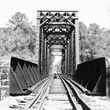
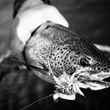


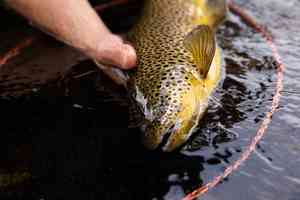

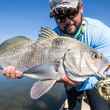



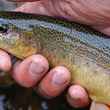








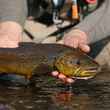
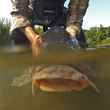
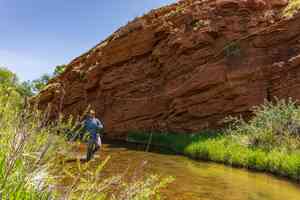

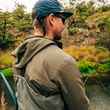
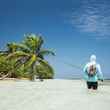
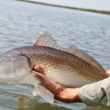
Comments